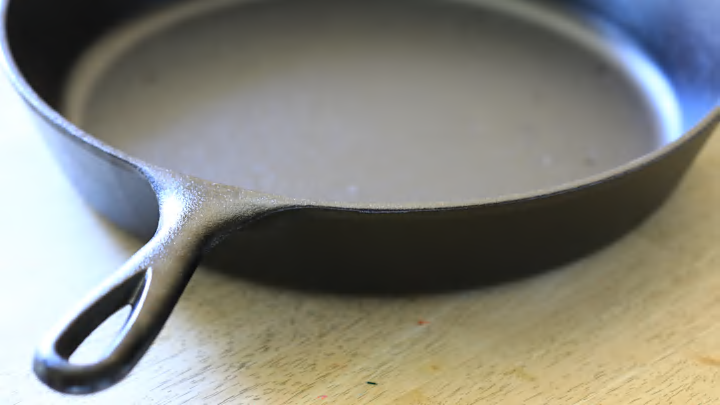Cast iron skillets are an essential item for countless home cooks. In comparison to some modern cookware, cast iron offers excellent heat distribution and retention and can last for decades. It also eliminates the need for chemical nonstick surfaces found in aluminum sets. Properly maintained, the surface develops its own nonstick properties that can be revived when it starts to wear.
Some people assume that keeping that surface functioning means never cleaning the skillet, since soap or other cleaners might strip that coating. Fortunately that’s a myth. You do need to clean your cast iron skillet—you just need to do it correctly.
- How to Season a Cast Iron Skillet
- The Best Way to Clean a Cast Iron Skillet
- Why You Should Clean Cast Iron With Soap
- How Prevent Cast Iron From Rusting
How to Season a Cast Iron Skillet
When people refer to “seasoning” a cast iron pan, they’re talking about heating up cooking oils until the fat polymerizes, or becomes a solid. One technique is to rub canola or vegetable oil on the pan and then bake it in an oven. That fat seeps into the surface of the skillet, creating a slippery coating that helps food slide off while insulating the pan from rust.
You probably won’t have to do this for a new pan, as they usually come pre-seasoned. But upkeep is still necessary: Periodic polymerizing maintains the coating, while harsh and abrasive cleaning—like tossing it into a dishwasher or taking a scouring pad to it—can remove it.
That fatty coating is why some people believe you should never clean a cast iron pan with soap. But that’s not just unsanitary; it can also pass unwanted flavors from one dish to the next.

The Best Way to Clean a Cast Iron Skillet
There are a variety of methods for cleaning cast iron, but most boil down to the same principle: Getting rid of gunk without harming the seasoned layer.
You should tackle the job while the pan is still warm (though obviously not so hot you burn yourself). That way, any caked-on gunk won’t have time to settle in. Run the skillet under hot water and use a scrubber sponge made for cast iron to avoid stripping too much of the seasoning.
Rubbing a small amount of salt into the pan with a paper towel can also help loosen food debris. You can then rinse the salt off or wipe it away with a paper towel. If the gunk still won’t come off, pouring some boiling water into the pan may do the trick. Try using tongs or another utensil to attack the mess.
Why You Should Clean Cast Iron With Soap
In addition to these mechanical measures, you can and should use soap to clean your cast iron—though most experts don’t recommend using a lot of it. It’s best to use a very small amount, which should help keep bacteria at bay without removing too much of the seasoning. Some anti-soapers believe heating the pan kills any lingering bacteria, but there don’t appear to be any formal studies done examining cast iron skillet pathogens, so factor that into your own personal risk assessment.
Some skillet enthusiasts believe an older, more seasoned pan will be more resistant to rougher scrubbing or excess soap. That’s anecdotal, though it makes sense that a thicker fatty layer would stand up better to tougher cleaning.
So why do some people advocate for no soap at all? The rule may have come from a time when dish detergents were made with lye and vinegar, making them far more abrasive than modern products.
How Prevent Cast Iron From Rusting

No matter what cleaning technique you use, it’s important to dry the pan as quickly as possible. Letting it sit damp will invite rust. A steel wool pad can remove some, but the best way to maintain your skillet is to prevent it from developing rust in the first place. Some people even put the pan on the stove on low heat to evaporate water quickly.
Once it’s dry, you can then apply some more vegetable oil or cooking spray to the surface with a paper towel to help keep the seasoning going. You don’t need a lot: Just add a drizzle and wipe the surface until the paper towel stops absorbing the oil.
And while cast iron can tackle a lot of jobs, you should probably avoid using it to simmer acidic foods like tomato sauce, which can harm the seasoning.
Despite these precautions, cast iron isn’t as delicate as its reputation suggests. If you avoid harsh cleansers and dishwashers, you’ll likely be able to pass it on to the next generation. That nonstick cookware from a discount retailer? Probably not.
Get More Cleaning Tips:
